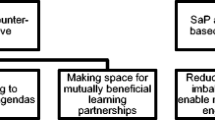Abstract
The students-as-partners approach challenges both students and faculty to eschew traditional roles and engage in practices of partnership thus disrupting hierarchy and the dominance of the faculty voice. The approach can be applied to a variety of areas from curriculum design to program planning in any discipline, including International Relations. In this chapter, written as a conversation between the two of us, we begin by situating ourselves as an ‘administrator/faculty’ settler (Heather) and ‘student; and Indigenous woman (Yahlnaaw). After introducing the students-as-partners model which informs our collaborative work, we turn to an example of the power of this model in action in the context of programming an Indigenous speakers’ series and we take turns telling our story from our own perspectives. Through the story we highlight the importance of creating spaces and opportunities for ‘disruption’ and we show how settlers must be willing to have their unconscious biases disrupted. Our story upsets constructions of students as ‘disruptive’ and highlights how faculty and administrators can either act to resist and silence student voices and engage in practices that allow them to be allies in disruption. Our story is one of everyday practice and our insights can be applied to any International Relations classroom.
Access this chapter
Tax calculation will be finalised at checkout
Purchases are for personal use only
Similar content being viewed by others
References
D’Costa, B. (2006). Marginalized identity: New frontiers in research for IR? In B. Ackerly, M. Maria Stern, & J. True (Eds.), Feminist methodologies for International Relations (pp. 129–152). Cambridge: Cambridge University Press.
Edōsdi / Thompson, J. C., & Yahlnaaw / Grant, A. (2017). Decolonizing our colonized minds. Paper presented at World Indigenous Peoples Conference on Education (WIPCE), Toronto, 28 July 2017.
Dauphinee, E. (2010). The ethics of autoethnography. Review of International Studies, 36(3), 799–818. https://doi.org/10.1017/S0260210510000690.
Enloe, C. (1996). Margins, silences and bottom rungs: How to overcome the underestimation of power in the study of international relations. In S. Smith, K. Booth, & M. Zalewski (Eds.), International theory: Positivism and beyond (pp. 186–202). Cambridge: Cambridge University Press.
Felten, P., Abbot, S., Kirkwood, J., Long, A., Lubicz-Nawrocka, T., Mercer-Mapstone, L., et al. (2019). Reimagining the place of students in academic development. International Journal of Academic Development, 24(2), 192–203.
Healey, M., Flint, A., & Harrington, K. (2014). Engagement through partnership: Students as partners in learning and teaching in higher education. Heslington: HE Academy.
Healey, M., Flint, A., & Harrington, K. (2016). Students as partners: Reflections on a conceptual model. Teaching & Learning Inquiry, 4(2), 1–12. https://doi.org/10.20343/teachlearninqu.4.2.3.
Kehler, A., Verwoord, R., & Smith, H. (2017). We are the process: Reflections on the underestimation of power in students as partners in practice. International Journal for Students as Partners, 1(1), 1–15. https://doi.org/10.15173/ijsap.v1i1.3176.
Kirkness, V. J., & Barnhardt, R. (2001). The four R’s—Respect, relevance, reciprocity, responsibility. In R. Hayoe & J. Pan (Eds.), Knowledge across cultures: A contribution to dialogue among civilizations. Hong Kong: Comparative Education Research Centre, The University of Hong Kong. Available at: https://www.afn.ca/uploads/files/education2/the4rs.pdf.
Mercer-Mapstone, L., & Abbott, S. (2020). The power of partnership: Students, staff, and faculty revolutionizing higher education. Elon University: Center for Engaged Learning. Available at: https://www.centerforengagedlearning.org/books/power-of-partnership/.
Shor, I. (1992). Empowering education: Critical teaching for social change. Chicago: University of Chicago Press.
Smith, H. A. (2017). Unlearning: A messy and complex journey with Canadian foreign policy. International Journal, 72(2), 203–216. https://doi.org/10.1177/0020702017711702.
Smith, H. A., Verwoord, R., Veitch, C., & Yahlnaaw. (2019). Unpacking power hierarchies in students as partners practices. Research Report Submitted to BCcampus September 2019. Available at: https://bccampus.ca/wp-content/uploads/2019/10/BCCampus-Research-Report-Unpacking-Power-Hierarchies-in-Students-as-Partners-Practices.pdf.
Tuck, E., & Yang, K. W. (2012). Decolonization is not a metaphor. Decolonization: Indigeneity, Education & Society, 1(1), 1–40.
Wilson, S. (2008). Research is ceremony: Indigenous research methods. Nova Scotia: Fernwood Publishing.
Yahlnaaw. (2019). T’aats’iigang: Stuffing a jar full. International Journal for Students as Partners, 3(2), 6–10. https://doi.org/10.15173/ijsap.v3i2.4081.
Author information
Authors and Affiliations
Corresponding author
Editor information
Editors and Affiliations
Rights and permissions
Copyright information
© 2021 The Author(s), under exclusive license to Springer Nature Switzerland AG
About this chapter
Cite this chapter
Smith, H.A., Yahlnaaw (2021). Disruption as Reconciliation: Lessons Learned When Students as Partners Become Students as Teachers. In: Smith, H.A., Hornsby, D.J. (eds) Teaching International Relations in a Time of Disruption. Political Pedagogies. Palgrave Macmillan, Cham. https://doi.org/10.1007/978-3-030-56421-6_4
Download citation
DOI: https://doi.org/10.1007/978-3-030-56421-6_4
Published:
Publisher Name: Palgrave Macmillan, Cham
Print ISBN: 978-3-030-56420-9
Online ISBN: 978-3-030-56421-6
eBook Packages: Political Science and International StudiesPolitical Science and International Studies (R0)




